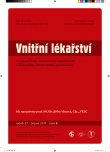-
Medical journals
- Career
A growing problem – human papillomavirus and head and neck cancers
Authors: Z. Mechl 1; J. Neuwirthová 2; Dagmar Brančíková 1
Authors‘ workplace: Interní hematoonkologická klinika Lékařské fakulty MU a FN Brno, pracoviště Bohunice, přednosta prof. MUDr. Jiří Mayer, CSc. 1; Klinika otorhinolaryngologie a chirurgie hlavy a krku Lékařské fakulty MU a FN u sv. Anny Brno, přednosta prof. MUDr. Rom Kostřica, CSc. 2
Published in: Vnitř Lék 2011; 57(3): 288-292
Category: 60th birthday of prof. Mudr. Jiřího Vítovce, CSc, FESC
Overview
High-risk human papillomavirus (HPV) are implicated in the development of a subset of head and neck cancers, especially those arising from the lingual or palatine tonsils. HPV-associated cancer of the head and neck represent a different disease entity from those associated with the traditional risk factors of tobacco and alcohol use. There has been as increase in the annual incidence of HPV-related cancers in Europe and USA in the past years. It has now become clear that a subset of the head and neck tumors is a sexually transmitted disease with distinct pathogenesis and clinical and pathological features. Research efforts are now focusing on deintensification of treatment to reduce treatment associated morbidity. The potential application of HPV targeted terapies in HPV associated cancers is an area of active research.
Key words:
head and neck cancer – human papillomavirus
Sources
1. Stanley M. HPV associated cancers on the rise, a growing problem? The Lancet Conference, HCG and Cancer, Amsterdam, November 12.–13. 2010. Abstr. 2.
2. Syrjänen S. The role of human papilomavirus infection in head and neck cancers. Ann Oncol 2010; 21: (Suppl 7): vii243–vii245.
3. Fakhry C, Westra WH, Li S et al. Improved survival of patients with human papillomavirus-positive head and squamous carcinoma in a prospective clinical trial. J Nat Cancer Inst 2008; 100 : 261–269.
4. Licitra L, Zigon G, Gatta G et al. Human papillomavirus in HNSCC: a European epidemiologic perspective. Hematol Oncol Clin North Am 2008; 22 : 1143–1153.
5. Chaturvedi AK. HPV and incidence trends for head and neck cancer. The Lancet Conference, HCG and Cancer, Amsterdam, November 12.–13. 2010. Abstr. 25.
6. Gillison ML. HPV and prognosis for patients with oropharynx cancer. Eur J Cancer 2009; 45 (Suppl 1): 383–385.
7. Psyrri A, Gouveris P, Vermorken JB. Human papillomavirus-related head and neck tumors: clinical and research implications. Curr Opin Oncol 2009; 21 : 201–205.
8. Hansson BG, Rosenquist K, Antonsson A et al. Strong association between infection with human papillomavirus and oral and oropharyngeal squamous cell carcinoma: a population-based case-control study in southern Sweden. Acta Otolaryng 2005; 125 : 1337–1344.
9. Ang KK, Harris J, Wheeler R et al. Human Papillomavirus and Survival of Patients with Oropharyngeal Cancer. N Engl J Med 2010; 363 : 24–36.
10. Posner M. Human Papillomavirus and Oropharyngeal Cancer a Growing Epidemic a New Biology. The Lancet Conference, HCG and Cancer, Amsterdam, November 12.–13. 2010. Abstr. 27.
11. Psyrri A, DiMaio D. Human papilomavirus in cervical and head-and-neck cancer. Nat Clin Prac Oncol 2008; 5 : 24–31.
12. Gillison ML. Therapeutic implication of HPV positive tumors. 35th ESMO Congres. Milan 8.–12. October 2010. Abstr. 33IN.
13. Mulcahy N. To Their Detriment, HPV-Positive Head and Neck Cancer Patient May Also Be Smokers. Clin Cancer Res 2010; 16 : 1226–1235.
14. Gillison M. Evolving treatment paradigms in the management of oropharygeal cancer. The Lancet Conference, HCG and Cancer, Amsterdam, November 12.–13. 2010. Abstr. 33.
15. Lehtinen M. Implementing human papillomavirus vaccination. The Lancet Conference, HCG and Cancer, Amsterdam, November 12.–13. 2010. Abstr. 22.
16. Trimble C. Therapeutic HPV vaccines. The Lancet Conference, HCG and Cancer, Amsterdam, November 12.–13. 2010. Abstr. 31.
17. Hsu KF, Hung CF, Cheby WF et al. Enhencement of suicidal DNA vaccine potency by linking Mycobacterium tuberculosis heat shock protein 70 to an antigen. Gene Ther 2001; 8 : 376–379.
Labels
Diabetology Endocrinology Internal medicine
Article was published inInternal Medicine

2011 Issue 3-
All articles in this issue
- Internal medicine and cardiology, internists and cardiologists
- Left ventricular end-systolic wall stress during antihypertensive treatment
- Dyslipidemia and obesity 2011. Similarities and differences
- Autoimmune pancreatitis and IgG-positive sclerosing cholangitis
- The incidence of dyslipidemia in a sample of asymptomatic probands established by the means of Lipoprint system
- External factors catalyzing the development of tumours or providing protection against them
- Does the medicine have its “trendy” diseases?
- A growing problem – human papillomavirus and head and neck cancers
- Microalbuminuria. From diabetes to cardiovascular risk
- The ankle brachial index in type 2 diabetes
- Thrombohaemorrhagic syndrome in patients with a myeloproliferative disease with thrombocythemia
- Residual risk of cardiovascular complications and its reduction with a combination of lipid lowering agents
- A network of comprehensive cancer care centres in the Czech Republic
- Variability in blood pressure and arterial hypertension
- Internal Medicine
- Journal archive
- Current issue
- Online only
- About the journal
Most read in this issue- Microalbuminuria. From diabetes to cardiovascular risk
- External factors catalyzing the development of tumours or providing protection against them
- Internal medicine and cardiology, internists and cardiologists
- Left ventricular end-systolic wall stress during antihypertensive treatment
Login#ADS_BOTTOM_SCRIPTS#Forgotten passwordEnter the email address that you registered with. We will send you instructions on how to set a new password.
- Career

